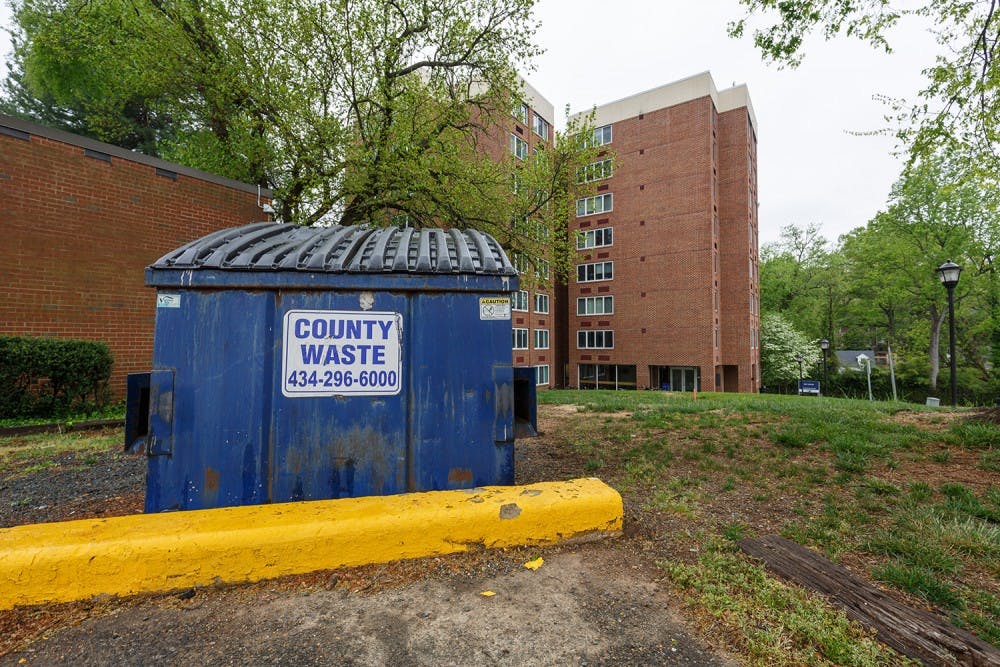While sustainability initiatives have become much more popular in recent years among students, many still do not recycle in on-Grounds housing.
“Every student makes waste. Every day, every student makes choices that affect their individual footprint and it affects the University’s overall footprint. These choices are about things like waste, water, energy, food,” said Jesse Warren, the University’s sustainability program manager for buildings and operations.
One of these choices is whether to recycle one’s personal waste in on-Grounds housing. This requires sorting products into three major groups — plastic, metal and glass; paper and cardboard; and landfill waste — then bringing the recycling out to bins located next to the dumpsters outside of buildings.
“We don’t look at it as being that much harder than taking out the trash,” Warren said. “You’re already making a trip down there to empty the landfill material, so if you sort, it’s easy to deposit your plastic, metal, glass as well as the paper and cardboard while you’re there.”
In first-year dorms, individual recycling bins are a fairly standard feature for each room, but are not always provided because they are not part of the official move-in equipment.
Sonny Beale, recycling programs superintendent, said when the individual bin program was first introduced a couple years ago, some students used the bins, while others returned them to facilities management.
“This year it’s been more of a by-request type system. We tried to get them out to each of the dorm rooms, both in first-year and upperclass dorms and have found that many of them end up in closets or left outside of the recycling centers from people that either have little or no interest in participating in the programs,” Beale said.
Beale said the returning of bins makes it difficult to determine what approaches should be considered next. If bins are included in housing move-in equipment, this adds another item that may need to be replaced each year. If they are not included, students may be less likely to find ways to recycle on their own.
“There’re no recycling bins in our room unless the roommates specify that one of their trash cans is going to be for recycling and one of them’s gonna be the trash, but let’s be honest, not many rooms do that,” Min Soo Choi, a first-year College student living in Lefevre, said.
Choi said he knows he could request a bin from facilities management if he felt so inclined, but said communal hall recycling bins may be even more efficient than individual bins.
Mary Beth Barksdale and Aurora Bays-Muchmore, first-year College students living in Balz-Dobie, said communal bins would add another task to the list of housekeepers’ tasks, but may motivate students to recycle things like soda bottles or paper boxes in communal dorm areas.
Housing and Residence Life works to include sustainability as a part of dorm life.
“We work with our partners at Sustainability to really get the best practices for our dorm and residential living, including in our opening meetings and in some of our later programming, so that that is very oriented to educating residents on those values and then incentivizing and promoting a norm around those values,” said Jackson Nell, current resident staff chair and a fourth-year College student.
Much of this information is spread by Sustainability Advocates, student volunteers who work with the Office of Sustainability to disseminate information to their peers about ways they can reduce their environmental footprint.
“Some of U.Va.’s brightest sustainability leaders, who go on to have careers in sustainability, started out in the SA program,” Nina Morris, sustainability outreach and engagement manager, said in an email to The Cavalier Daily. “The SAs are instrumental in the planning, promotion and implementation of some of UVA’s biggest sustainability events, such as Game Day Challenge Football and Basketball.”
A current initiative is a one-month composting pilot in the International Residential College and Brown College. Students residing in these areas have the option of composting food waste in a bin outside of their buildings.
“The idea is this is entirely student-run, so the students take responsibility for the success of the program and the fact that we’re going to get good clean compost that’s not contaminated from the facilities,” Warren said.
In terms of daily actions, students have many opportunities to improve the environment at a personal level through their diet and by using reusable to-go containers at dining halls.
“[One way is] to incorporate plant-forward meals into your diet. U.Va. Dining offers great vegetarian and vegan options in dining halls and student groups like Greens to Grounds can help bring fresh, local produce right to U.Va. students,” Morris said. “Another good practice is to be thoughtful of the electricity and water that you consume.”
At an administrative level, sustainable construction projects, such as the Alderman Road first-year dorms and future McCormick Road renovations, will reduce energy and water use on-Grounds.
For Morris, she said her biggest hope for the future is meeting the goals and actions described in the University’s Sustainability Plan, an initiative “developed by over 100 students, faculty, staff and community members.”
Beale said he hopes prospective students will be drawn to the University because they know students care about green practices here.
“I hope that U.Va. will continue to increase the opportunities for sustainability-related curriculum, research and leadership, to send students out in the world with the knowledge and passion to take on global environmental challenges,” Andrea Trimble, director of the Office of Sustainability, said in an email statement.







